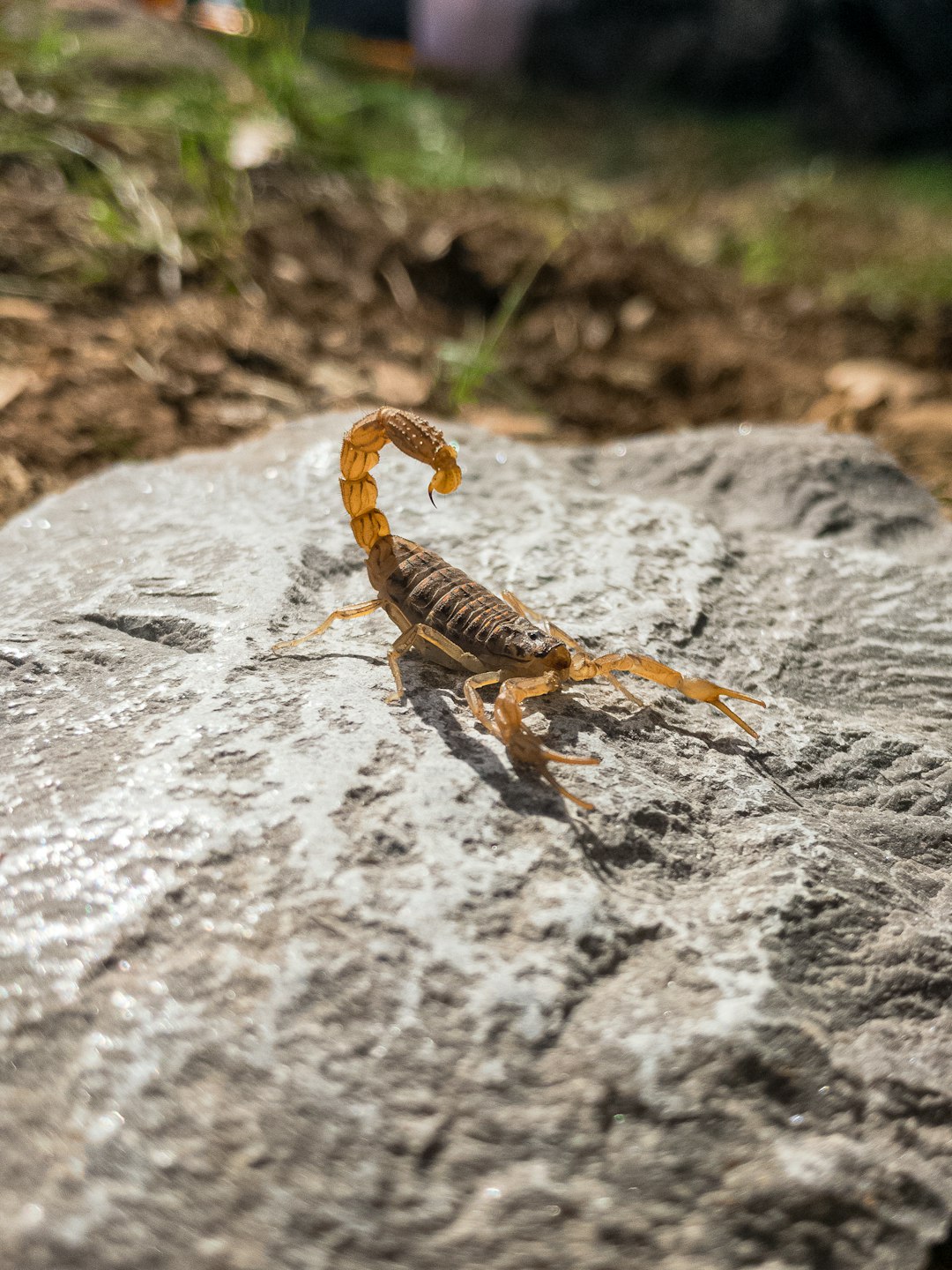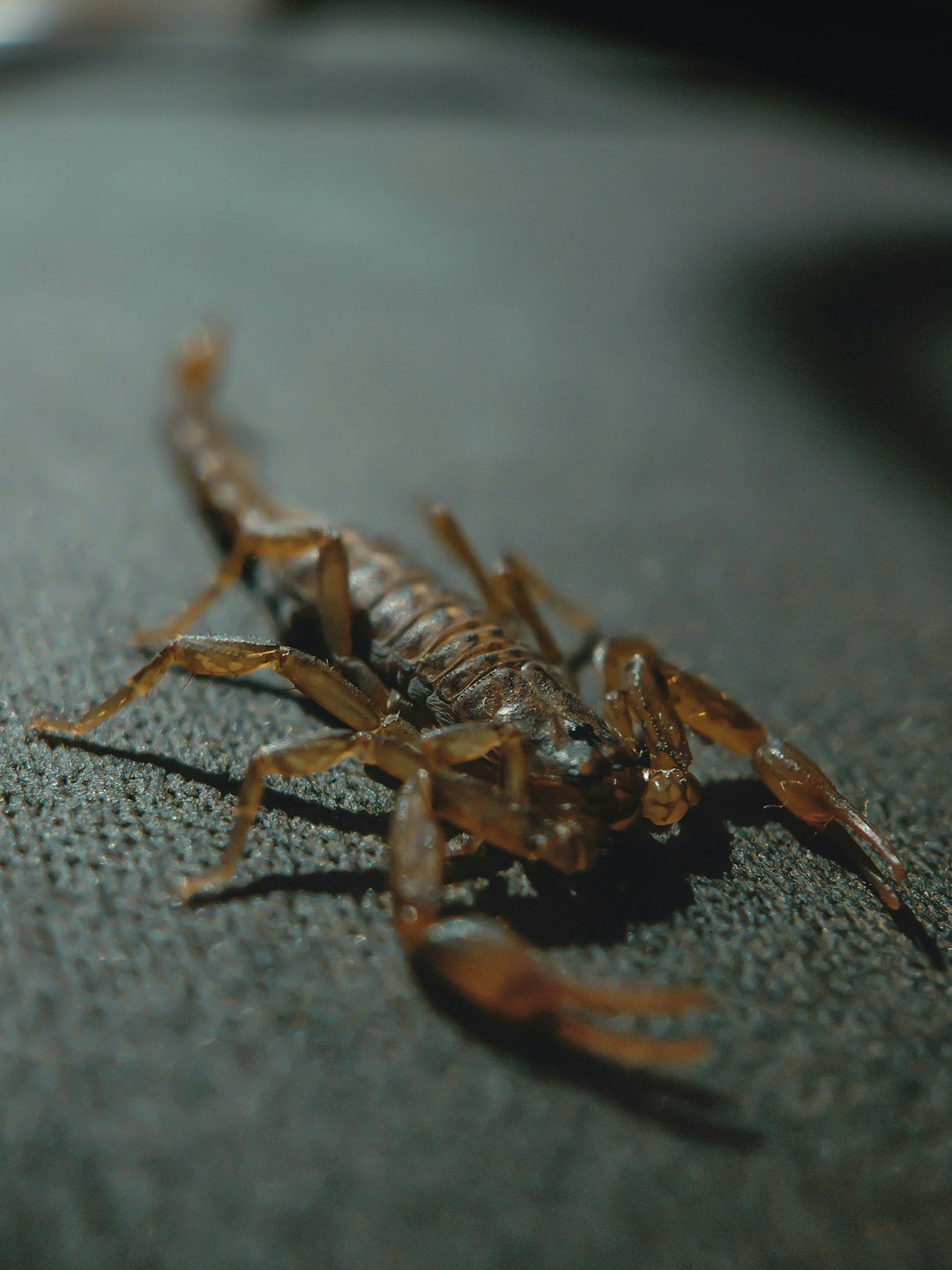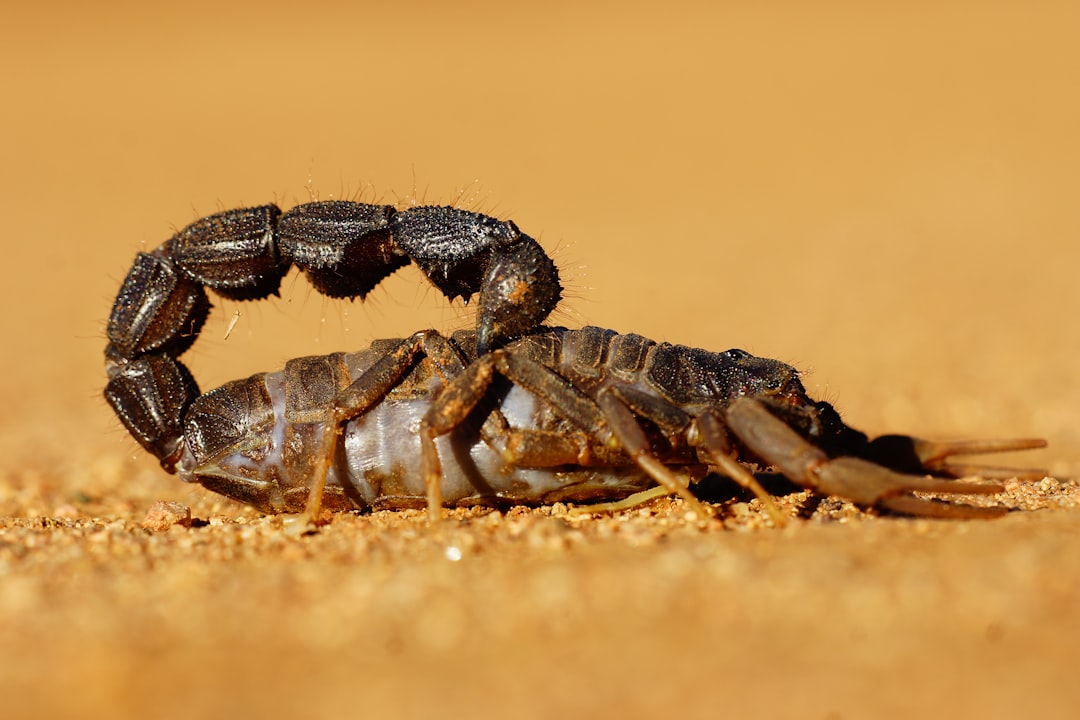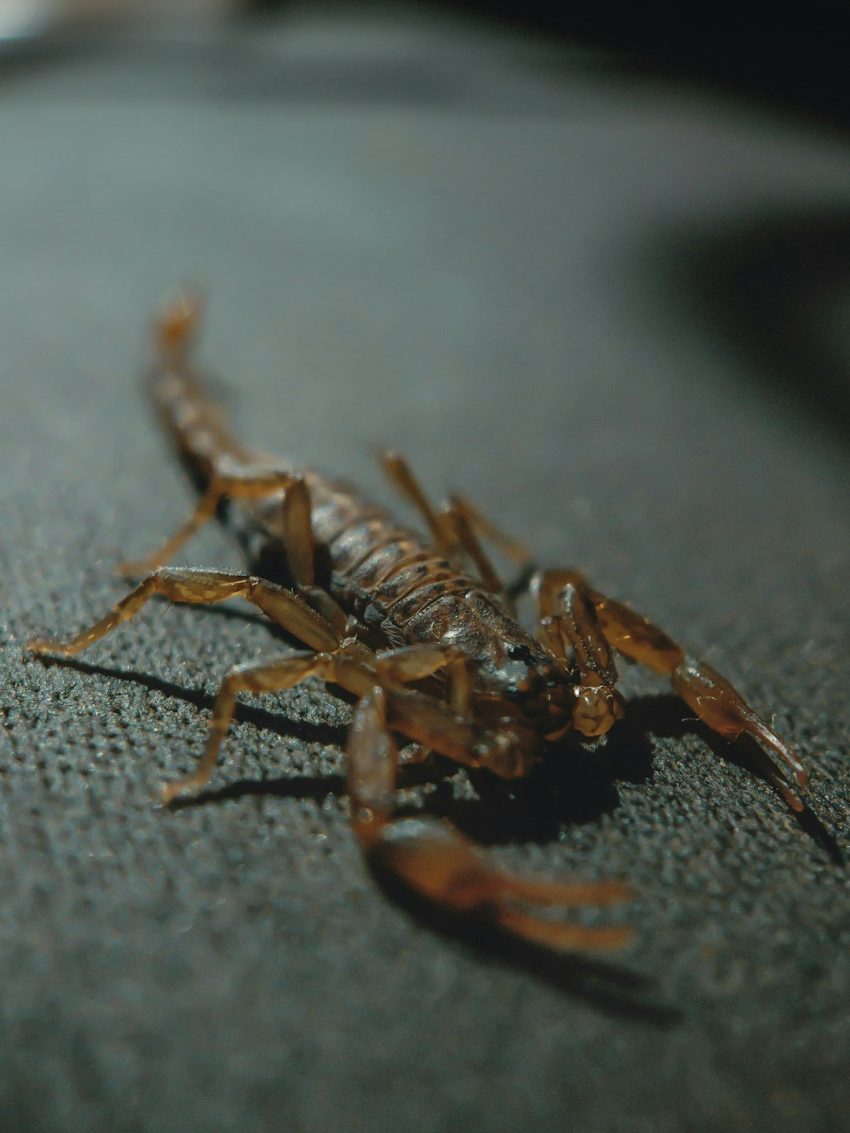Effective scorpion control necessitates a multifaceted approach that combines habitat modification, exclusion strategies, and regular monitoring. Homeowners should clear mulch, rock piles, and dense vegetation within a 10-foot radius of their homes, dim outdoor lighting to avoid attracting scorpions, and seal cracks and gaps to prevent entry. Landscaping with scorpion-repellent plants like lavender, marigolds, or citrus, and maintaining short grass and trimmed hedges, helps create an uninviting environment for these arachnids. Using fine mesh screens on windows and vents, and establishing a perimeter of pebbles or crushed granite around the property's edge, can further deter scorpions. Regular sanitation, including eliminating clutter, standing water, and organic matter, along with keeping kitchens clean, denies scorpions resources they need for survival. Proactive monitoring using detection devices like UV lighting traps and glue boards is essential to identify scorpion activity and inform targeted actions. For those needing specialized assistance, professional pest control services provide tailored integrated pest management solutions that include chemical treatments, habitat alterations, and exclusion methods to minimize scorpion populations effectively. By consistently applying these strategies, homeowners can significantly reduce the risk of scorpion infestations, ensuring a safer and more comfortable living environment.
When scorpions invade your space, transforming your backyard into a fortress against these arachnids becomes a priority. This article delves into landscape strategies that effectively deter scorpions from making your home their own. From understanding their behavior and habitats to implementing targeted design modifications, we explore how to create a natural barrier with strategic plant selection, emphasizing the importance of regular maintenance and sanitation for effective scorpion control. Additionally, we’ll examine advanced tactics, including monitoring systems and professional assistance, to safeguard your living environment against these eight-legged intruders.
- Understanding Scorpion Behavior and Habitats for Effective Scorpion Control Strategies
- Landscape Design Modifications to Deter Scorpions from Homes as Part of Scorpion Control Measures
- Implementing Natural Barriers and Plant Selection for Scorpion Exclusion in Your Yard
- The Role of Regular Maintenance and Sanitation in Your Scorpion Control Plan
- Advanced Tactics for Scorpion Control: Monitoring and Professional Assistance
Understanding Scorpion Behavior and Habitats for Effective Scorpion Control Strategies

To effectively manage scorpion populations around your home, it’s crucial to understand their behavior and preferred habitats. Scorpions are nocturnal arachnids that seek out moist, dark environments during daylight hours. They often hide under rocks, logs, and debris, as well as in dense vegetation or the cracks of structures. By identifying these potential scorpion havens, homeowners can take proactive measures to reduce their presence. A key component of scorpion control is modifying the landscape to eliminate hiding spots. This includes removing loose mulch, rock piles, and trimming overgrown foliage within a 10-foot perimeter around the home. Additionally, keeping external lights dim or directed away from points of entry can discourage scorpions from approaching your home, as they are attracted to light sources. Understanding their behavior also involves recognizing that scorpions enter homes in search of food and shelter. Sealing cracks and gaps in foundations, windows, and doors is an effective barrier strategy against these pests. Employing a combination of exclusion methods, habitat modification, and monitoring with traps or baits can significantly reduce the likelihood of a scorpion infestation, making your home less welcoming to these arachnids. Regularly inspecting the premises for any signs of scorpions and taking immediate action upon sighting is an integral part of ongoing scorpion control strategies.
Landscape Design Modifications to Deter Scorpions from Homes as Part of Scorpion Control Measures

Landscaping plays a pivotal role in deterring scorpions from invading your home. To effectively integrate scorpion control into landscape design, it’s crucial to modify the outdoor environment to make it less hospitable for these arachnids. Begin by removing any rocks, debris, or woodpiles that could provide scorpions with hiding spots close to your dwelling. Maintain a clean and orderly yard, as clutter offers both shelter and prey for scorpions. Next, consider the vegetation you select for your garden; some plants attract insects that scorpions feed on. Opt for scorpion-resistant plants, which tend to have waxy or hairy leaves that scorpions find uncomfortable. Additionally, ensure that grass and shrubs are well-trimmed, as tall vegetation can harbor scorpions. By altering the landscape design to minimize hiding places and preferred habitats, you significantly reduce the likelihood of scorpions making their way into your home.
Furthermore, incorporating scorpion control measures into your landscaping strategy involves using barriers to prevent entry. Install fine mesh screens over vents, windows, and any other openings that connect the indoors with the outside. Scorpions are small enough to squeeze through tiny gaps, so it’s essential to use properly sealed mesh that is fine enough to deter them. Keeping your home’s exterior lighting subdued can also help, as bright lights attract insects, which in turn attract scorpions. By thoughtfully modifying your landscape design and implementing physical barriers, you create an environment that naturally repels scorpions, enhancing the effectiveness of your overall scorpion control plan.
Implementing Natural Barriers and Plant Selection for Scorpion Exclusion in Your Yard

When it comes to scorpion control, creating natural barriers and selecting appropriate vegetation can significantly reduce the likelihood of these arachnids infiltrating your yard. One effective strategy is to establish physical barriers around the perimeter of your property. Utilize materials like fine pebbles or crushed granite along the base of walls and fences to deter scorpions, as they are less likely to cross such surfaces due to their sensitivity to textures. Additionally, ensure that windows and doors have well-fitted screens to prevent scorpions from entering your home.
In terms of plant selection for scorpion exclusion, certain plants possess natural repellent properties. For instance, lavender, marigolds, and citrus plants emit fragrances and oils that scorpions find unpleasant. Incorporating these into your garden can create an uninviting environment for scorpions. Furthermore, maintaining a well-groomed landscape with short grass and trimmed hedges minimizes scorpion habitats, as they prefer dense shrubbery and undisturbed areas for nesting. By thoughtfully selecting plants and keeping your yard tidy, you can significantly contribute to effective scorpion control.
The Role of Regular Maintenance and Sanitation in Your Scorpion Control Plan

Regular maintenance and meticulous sanitation play pivotal roles in an effective scorpion control plan. By keeping your property clean and well-maintained, you significantly reduce the likelihood of scorpions making your home their own. Remove debris and clutter from both indoors and out, as these environments offer scorpions shelter and hunting grounds for their prey. Trim vegetation near the structure to prevent scorpions from traversing from exterior areas to interior spaces. Empty standing water from containers and fix leaky faucets to eliminate moist hideouts that attract insects—scorpions’ primary food source. Regularly inspect and seal any cracks or crevices in foundations and walls to cut off potential entry points. Additionally, maintaining a clean kitchen and sealing trash bins can deprive scorpions of the organic matter and food scraps they require for survival. By incorporating these maintenance practices into your routine, you create an inhospitable environment for scorpions, thereby fortifying your home against these arachnids.
Advanced Tactics for Scorpion Control: Monitoring and Professional Assistance

When it comes to advanced tactics for scorpion control, monitoring and professional assistance play pivotal roles in effectively deterring these arachnids from homes. Monitoring involves a proactive approach where homeowners set up scorpion-specific detection devices such as UV lighting traps or glue boards around the perimeter of their property. These tools can help identify hotspots where scorpions are most active, allowing for targeted intervention. By analyzing the data collected from these monitoring devices, one can pinpoint areas that require more robust sealing and exclusion strategies to prevent future intrusions.
In instances where scorpion activity is particularly high or when homeowners prefer a hands-off approach, professional assistance becomes indispensable. Pest control experts are equipped with the knowledge and resources necessary to implement comprehensive scorpion control measures. They offer integrated pest management solutions that may include chemical treatments, habitat modification, and exclusion techniques designed to create an inhospitable environment for scorpions. These professionals can also provide valuable advice on landscaping modifications to minimize potential hiding spots around the home, such as keeping shrubbery trimmed and removing debris that could serve as harborages. By combining monitoring with professional expertise, homeowners can significantly reduce the risk of scorpion infestations and ensure a safer living space.
In conclusion, effective scorpion control begins with a comprehensive understanding of their behavior and preferred habitats. Homeowners can fortify this knowledge by implementing strategic landscape design modifications that deter these arachnids, such as creating natural barriers and selecting scorpion-averse plants. Regular maintenance and meticulous sanitation further enhance your defenses against scorpions. For advanced pest management, consider employing monitoring systems and professional assistance to ensure a resilient scorpion control plan. With these measures in place, you can significantly reduce the risk of scorpions invading your living spaces, making your home a less welcoming environment for these creatures.
